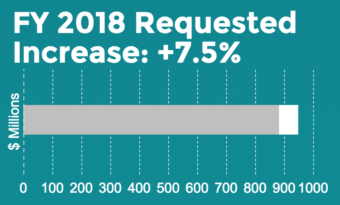The 2025 Strategic Plan of the Board of Regents, adopted in January 2016, projects USHE institutions need a combined annual average budget increase of 5% to fund new enrollment growth, student support, compensation, operation and maintenance of facilities, program development, and information technology needs. Over the past two years (FY 2016, 2017), the USHE operating budget has increased approximately $130.7 million (an average annual increase of 4.6% compared to FY 2015), falling slightly behind the projected need.
 The 2025 Strategic Plan guided the preparation of the current FY2018 USHE Unified Budget Request adopted in September 2016 in preparation for the 2017 Legislative Session. These priorities are developed in coordination with USHE Presidents and their institutional leadership. A primary objective of this year’s budget request is to minimize the reliance on tuition increases to support higher education’s strategic objectives and operations. In order to keep tuition as low as possible, the budget request proposes a 7.5% increase in state tax funds.
The 2025 Strategic Plan guided the preparation of the current FY2018 USHE Unified Budget Request adopted in September 2016 in preparation for the 2017 Legislative Session. These priorities are developed in coordination with USHE Presidents and their institutional leadership. A primary objective of this year’s budget request is to minimize the reliance on tuition increases to support higher education’s strategic objectives and operations. In order to keep tuition as low as possible, the budget request proposes a 7.5% increase in state tax funds.
If the Legislature were to fully fund the current budget request, it is estimated that first-tier tuition would need to increase 2% to support the legislative-required match for employee compensation. (If the Legislature chose to fully fund the request and also cover the compensation match of $10,316,800, no first-tier tuition increases would be needed for this year.)
The USHE budget request is prioritized into the following categories:
- Employee Compensation
- New Student Growth & Market Demand
- Performance Funding
- Regents’ Scholarship Growth
Collectively, the USHE budget reflects the top priorities of USHE institutions to maintain operations and help address the most pressing budget needs. Each USHE institution has developed a detailed plan of how new funding would be used. A brief summary of the initiatives for these categories is included below. The full narrative from each of the institutions is also available.
Employee Compensation ($32,878,200)
The Board of Regents is requesting a 3% compensation merit-based increase for employees.
Public higher education in Utah, even with its innovative approaches to instruction, is 85% personnel-based. The quality of USHE institutions is rooted in its employees. USHE institutions compete nationally for quality talent. Wages for faculty/staff at USHE institutions are all below the market average of similar institutions across the country according to recent national surveys.
New Student Growth ($4,117,400)
This priority is to fund new student growth (Fall 2017 over Fall 2016). These funds will be used to expanding capacity for teaching and support functions. Specific initiatives include: expansion of bottleneck/high demand courses in general education (all instructional types); development of a new quantitative literacy course; hiring additional student services staff in academic advising, financial aid, mental health counseling, prevention programs for sexual assault and violence, and IT infrastructure upkeep.
Market Demand: ($19,453,400)
This priority reflects program development and enhancement in specific high-demand areas including business, STEM and health care. This would also help fund improvements in program quality such as project-based learning initiatives, additional veterans’ services to assist students in completing programs needed by Utah employers, and the purchase of library equipment, subscriptions, and electronic resources.
Performance Funding: ($9,979,000)
This priority request reflects funding based on higher education outcomes, specifically:
- Degrees and certificates granted
- Services provided to traditionally underserved populations
- Responsiveness to workforce needs
- Institutional (graduation) efficiency
- Graduate research for research universities
Funding based on these performance outcomes would go to specific initiatives intended to directly assist students support for underserved and first generation students, mental health services, intrusive advising, peer mentoring, tutors, outreach, and scholarships for need-based students.
Regents’ Scholarship
Initial estimates project the Legislature would need to appropriate an additional $11,205,800 in new ongoing funds to accommodate this year’s growth in awards. Since its inception, the average growth in scholarship awards has been 15-20% annually. If the Exemplary Academic Achievement Award was reduced from $1,250 per semester to $1,000 per semester, the Legislature would need to appropriate $8,275,800 to support the current program. If the Legislature does not fund the Regents’ Scholarship next year, it is estimated the Exemplary Academic Achievement Award would be reduced to $290 per semester per student.
The Board of Regents are expected to reaffirm its priorities at its upcoming January 20 meeting on the eve of the 2017 Legislature which commences on January 23.

